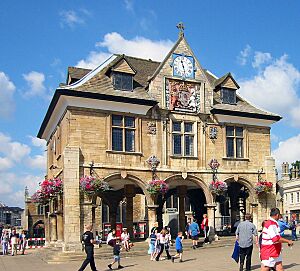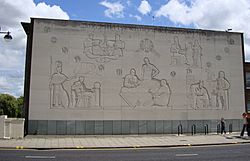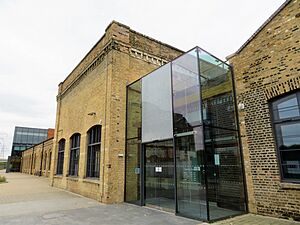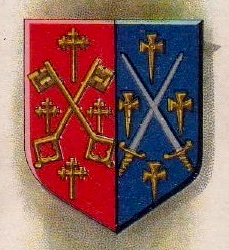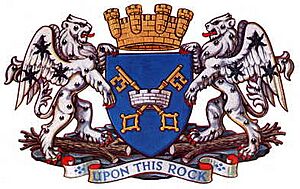Peterborough City Council facts for kids
Quick facts for kids Peterborough City Council |
|
|---|---|
 |
|
| Type | |
| Type |
Unitary authority
|
| Leadership | |
|
Mayor
|
|
|
Leader
|
|
|
Matthew Gladstone
Since January 2022 |
|
| Structure | |
| Seats | 60 councillors |
|
Political groups
|
|
| Elections | |
| First past the post (elected in thirds) | |
|
Last election
|
2 May 2024 |
|
Next election
|
7 May 2026 |
| Meeting place | |
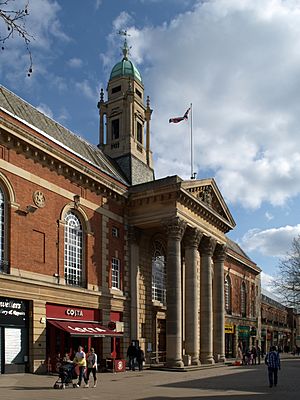 |
|
| Town Hall, Bridge Street, Peterborough, PE1 1HF | |
Peterborough City Council is the local government for Peterborough, a city in Cambridgeshire, England. A local authority is a group of elected people who make decisions and provide services for a specific area. Peterborough has had a council since 1874. It has changed over time. Since 1998, it has been a "unitary authority." This means it handles all local services, like a district council and a county council combined. Since 2017, the council has also been part of the Cambridgeshire and Peterborough Combined Authority.
The council has been under "no overall control" since 2019. This means no single political party has enough members to make decisions on its own. After the 2024 election, a group led by the Labour party formed to run the council. The council holds its meetings at Peterborough Town Hall. Its main offices are at Sand Martin House.
Contents
How Peterborough's Council Started
Peterborough has been a settlement for a long time. It became a city in 1541. This happened when the old St Peter's Abbey became Peterborough Cathedral. At that time, it didn't have a council to manage the city itself.
In 1790, a group called "improvement commissioners" was set up. They helped provide public services in the city. These services included things like street lighting and cleaning.
Becoming a Formal Council
In 1873, people discussed whether Peterborough should have a formal council. This council would take over the jobs of the commissioners. On 17 March 1874, Peterborough officially became a "municipal borough." This meant it had its own council. The council was made up of a mayor, six aldermen, and 18 councillors.
The new council had to create a police force. This was required by law. Later, in 1947, the local police forces joined together. They eventually became part of the Cambridgeshire Constabulary in 1974. The council also had to manage a fire brigade. This responsibility later moved to county councils.
Changes to County Areas
In 1889, elected county councils were created. Peterborough was part of a special area called the "Soke of Peterborough." This area had its own county council. The city and county councils worked closely together. They even built a shared building, Peterborough Town Hall, which opened in 1933.
In 1965, the Soke of Peterborough joined with Huntingdonshire. They formed a new county called Huntingdon and Peterborough.
Growing the City
In 1929, the city's boundaries grew. More areas like Gunthorpe and Werrington became part of Peterborough. The council's official name also changed to "mayor, aldermen and citizens of the city of Peterborough." It became known as the city council.
In 1967, Peterborough was named a "new town." This meant there were big plans to expand the city. A separate group, the "development corporation," was set up. They helped manage this growth.
The Modern Council (After 1974)
The current local government area of Peterborough was created in 1974. It brought together several smaller areas. The new area was named 'Peterborough' after its main settlement.
The new Peterborough district was given "borough status." This allowed the head of the council to be called the mayor. Peterborough also kept its "city status." This is why the council is called Peterborough City Council.
After 1974, Peterborough City Council was a "lower-tier" authority. This meant Cambridgeshire County Council provided bigger services for the whole county.
Becoming a Unitary Authority
In 1998, Peterborough City Council took on more responsibilities. It became a "unitary authority." This means it now handles both local and county-level services. So, it's like two councils in one! Even though it's a unitary authority, Peterborough is still part of the wider ceremonial county of Cambridgeshire.
Police services in the city are still handled by Cambridgeshire Constabulary. Firefighting is done by Cambridgeshire Fire and Rescue Service. There is also a special group called the Cambridgeshire and Peterborough Combined Authority. It was set up in 2017 and is led by an elected mayor.
How the Council Works
Peterborough City Council provides many services. These include things like waste collection, housing, planning, and education. Some parts of the district, especially rural areas, have their own smaller local councils called "civil parishes." These parishes handle very local matters. Much of the main Peterborough urban area does not have these smaller parish councils.
Council Leadership
The Mayor of Peterborough has a role that is mostly about ceremonies. The person who really leads the council is called the leader of the council. Here are the leaders since 1998:
| Councillor | Party | From | To | |
|---|---|---|---|---|
| Cathy Weaver | Labour | pre-1998 | 1999 | |
| Neville Sanders | Conservative | 1999 | 25 Jun 2003 | |
| Ben Franklin | Conservative | 25 Jun 2003 | 4 Apr 2006 | |
| John Peach | Conservative | 12 Apr 2006 | 18 May 2009 | |
| Marco Cereste | Conservative | 18 May 2009 | 10 May 2015 | |
| John Holdich | Conservative | 15 May 2015 | 9 May 2021 | |
| Wayne Fitzgerald | Conservative | 26 May 2021 | 1 Nov 2023 | |
| Mohammed Farooq | Peterborough First | 1 Nov 2023 | 20 May 2024 | |
| Dennis Jones | Labour | 20 May 2024 | ||
Council Members and Parties
After the 2024 election, the council looks like this:
| Party | Councillors | |
|---|---|---|
| Labour | 19 | |
| Peterborough First | 14 | |
| Conservative | 11 | |
| Liberal Democrats | 8 | |
| Green | 4 | |
| Independent | 4 | |
| Total | 60 | |
The next election for the council will be in May 2026.
Council Elections
The council has 60 councillors. These councillors represent 22 different areas called "wards." Each ward elects one, two, or three councillors. Elections happen three years out of every four. About a third of the council members are elected each time. They serve for four years. The wards are:
- Barnack
- Bretton
- Central
- Dogsthorpe
- East
- Eye, Thorney & Newborough
- Fletton & Stanground
- Fletton & Woodston
- Glinton & Castor
- Gunthorpe
- Hampton Vale
- Hargate and Hempsted
- North
- Orton Longueville
- Orton Waterville
- Park
- Paston & Walton
- Ravensthorpe
- Stanground South
- Werrington
- West
- Wittering
Where the Council Works
Before the city council was formed, the improvement commissioners met in a room on Westgate. When the council started in 1874, it met at the city's Guildhall. This building was built in 1671. The council's offices were in many different places around the city.
The current Town Hall was opened in 1933. It was built to be a shared space for both the city council and the Soke of Peterborough County Council.
In 2018, most of the council staff moved to Sand Martin House. This is a modern building at Fletton Quays. However, council meetings are still held at the historic Town Hall.
The Role of the Mayor
The city council chooses a mayor each year. The mayor serves for one year. The mayor is a very important person in the city. They lead council meetings. The mayor is expected to be fair and not take sides in politics. If there's a tie vote, the mayor gets an extra vote to decide. Here are the mayors since the council became a unitary authority:
- 1998–1999 Mary Beatrice Rainey
- 1999–2000 John Ernest Graham Bartlett
- 2000–2002 Raymond Arthur Pobgee
- 2002–2003 Clifford Stanley Horace Sneesby
- 2003–2004 David Raines
- 2004–2005 Raja Akhtar
- 2005–2005 John Ray Horrell
- 2006–2006 David Thorpe
- 2006–2007 Michael Burton
- 2007–2008 Marion Yvonne Todd
- 2008–2009 Patricia Nash
- 2009–2010 Irene Walsh
- 2010–2011 Keith Sharp
- 2011–2012 Paula Thacker
- 2012–2013 George Simons
- 2013–2014 June Stokes
- 2014–2015 David Over
- 2015–2016 John Peach
- 2016–2017 David Sanders
- 2017–2018 John Fox
- 2018–2019 Chris Ash
- 2019–2021 Gul Nawaz
- 2021-2022 Stephen Lane
- 2022-2023 Alan Dowson
- 2023-2024 Nick Sandford
- 2024-2025 Marco Cereste
Council Symbols
 | Frances Mary Albrier |
 | Whitney Young |
 | Muhammad Ali |


